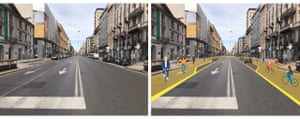Milan announces ambitious scheme to reduce car use after lockdown
Milan is to introduce one of Europe’s most ambitious schemes reallocating street space from cars to cycling and walking, in response to the coronavirus crisis.
The northern Italian city and surrounding Lombardy region are among Europe’s most polluted, and have also been especially hard hit by the Covid-19 outbreak.
Under the nationwide lockdown, motor traffic congestion has dropped by 30-75%, and air pollution with it. City officials hope to fend off a resurgence in car use as residents return to work looking to avoid busy public transport.
The city has announced that 35km (22 miles) of streets will be transformed over the summer, with a rapid, experimental citywide expansion of cycling and walking space to protect residents as Covid-19 restrictions are lifted.
The Strade Aperte plan, announced on Tuesday, includes low-cost temporary cycle lanes, new and widened pavements, 30kph (20mph) speed limits, and pedestrian and cyclist priority streets. The locations include a low traffic neighbourhood on the site of the former Lazzaretto, a refuge for victims of plague epidemics in the 15th and 16th centuries.
Marco Granelli, a deputy mayor of Milan, said: “We worked for years to reduce car use. If everybody drives a car, there is no space for people, there is no space to move, there is no space for commercial activities outside the shops.
“Of course, we want to reopen the economy, but we think we should do it on a different basis from before.
“We think we have to reimagine Milan in the new situation. We have to get ready; that’s why it’s so important to defend even a part of the economy, to support bars, artisans and restaurants. When it is over, the cities that still have this kind of economy will have an advantage, and Milan wants to be in that category.”
...
Pierfrancesco Maran, another of Milan’s deputy mayors, said: “We should accept that for months or maybe a year, there will be a new normality, and we have to create good conditions to live this new normality for everyone.
“I think in the next month in Milan, in Italy, in Europe, we will decide part of our future for the next decade. Before, we were planning for 2030; now the new phase, we are calling it 2020. Instead of thinking about the future, we have to think about the present.”
...
https://www.theguardian.com/world/2020/apr/21/milan-seeks-to-prevent-post-crisis-return-of-traffic-pollution
Izlazne strategije

- Guest
- Post n°226
 Re: Izlazne strategije
Re: Izlazne strategije

- Posts : 11340
Join date : 2014-10-28
- Post n°227
 Re: Izlazne strategije
Re: Izlazne strategije
to u beogradu ne može.
_____
most of us probably not getting better
but not getting better together

- Posts : 4836
Join date : 2016-06-09
Location : gotta have those beans
- Post n°228
 Re: Izlazne strategije
Re: Izlazne strategije
Misaone vežbe radi, eto, ta ulica sa prikaza je ekvivalent Bulevara od Pošte do Depoa, znači radnje, restorani, banke, tako to, commercial street... okej, osim što ima metro ispod umesto tramvaja po sredini.

- Guest
- Post n°229
 Re: Izlazne strategije
Re: Izlazne strategije
Erzsébet Biszak wrote:to u beogradu ne može.
Jep.
A nije mi Beograd ni pao na pamet, i podsvesno sam digao ruke od nj.

- Posts : 4836
Join date : 2016-06-09
Location : gotta have those beans
- Post n°230
 Re: Izlazne strategije
Re: Izlazne strategije
Beograd će dodati traku u Kneza Miloša, dve u Jurija Gagarina i skloniti tramvajski most na par godina, eto samo dok se na brzaka ne napravi novi isti takav. Let's agree to disagree.

- Posts : 4505
Join date : 2016-09-29
- Post n°231
 Re: Izlazne strategije
Re: Izlazne strategije
radiátor wrote:Beograd će dobiti raku u Kneza Miloša, dve u Jurija Gagarina
ne znam zasto al ovako sam procitao dok nisam malo bolje pogledao
_____
THE space age is upon us. Rockets are leaving our globe at
speeds unheard of only a few years ago, to orbit earth, moon, and
sun. People have visited the moon, we have sent space probes to
all but one of the planets, and words like "orbit" and "satellite" are
picked up by children in the nursery.

- Posts : 11340
Join date : 2014-10-28
- Post n°232
 Re: Izlazne strategije
Re: Izlazne strategije
treba dodati i da je beograd brdovit 

_____
most of us probably not getting better
but not getting better together

- Posts : 4836
Join date : 2016-06-09
Location : gotta have those beans
- Post n°234
 Re: Izlazne strategije
Re: Izlazne strategije
nalog sa ženinog laptopa wrote:radiátor wrote:Beograd će dobiti raku u Kneza Miloša, dve u Jurija Gagarina
ne znam zasto al ovako sam procitao dok nisam malo bolje pogledao
I to je bila opcija, ali su šatro planiranu podzemnu garažu duž gotovo cele ulice sasvim očigledno crtali u planove samo da bi mogli da opravdaju dozvole za proizvoljnu spratnost tamo gde je trebalo... pa posle lepo obrisaše.

- Guest
- Post n°235
 Re: Izlazne strategije
Re: Izlazne strategije
Evo malo hejta prema turizmu u kontekstu post-pandemijske perspektive
Rafia Zakaria, July 17Tourist Detraction
The tourism industry is closed; let’s keep it that way
“There is no room for tourists in a world of ‘displaced persons,’” the author Evelyn Waugh declared sulkily. The year was 1946, and the world was still reeling from the depredation and devastation of World War II. Waugh was right to be sorry; here was the beginning of the end of colonialism in its explicit forms, the end of the age of the white man as explorer-traveler heading off to the most remote corners of the world. The shrinking of empire felt like it meant the white man could no longer go anywhere and everywhere. Waugh need not have worried too much, however; people continued to be tourists after World War II, undeterred by any moral travesty involved in voraciously gawking at the world while others searched for mere shelter and survival.
Until March 2020, the white and Western traveler still inhabited a world bubbling over with opportunities for stomping through foreign grounds. Despite the indications of the adverse effects this was having on the world—trashed beaches, dying coral reefs, crumbling frescoes—no one was interested in staying put, in not seeing what their officemates or their neighbor or mother-in-law had already seen. Cities like Venice were rendered almost entirely performative—places where no one but tourists could afford to live and where the fantasy of Italian romance was created precisely for tourist consumption. The fact that tourism was destroying the city was of no concern to those who would be gone next week.
In 2015, five years before the world would stop, a little boy’s body washed up on the shores of the Mediterranean. Meanwhile, on other Mediterranean beaches, white bodies lay splayed out, cooking, browning, bronzing before they moved to the next attraction, the next adventure. There was a momentary moral outrage, but the world in 2015 was still too steeped in its hedonistic ways to nurse the concerns of black and brown others for very long. Ships full of migrants continued their treacherous crossings, refugees kept dying, and tourists kept soaking their skin in the sun, looking the other way.
The persistence of tourism was due at least in part to moral justifications for it. The millennial generation defined itself against Baby Boomer proclivities for material consumption by embracing a different kind of consumption, one that in the view of many was somehow less culpable. Hence the insatiable hunger among younger people for “experiences” over material items; according to a 2016 survey, 72 percent of millennials would rather spend money on going places and doing things. Travel began to mean wild (if pre-arranged) adventures, the more unique the more salable, all of it ennobled by its inchoate immateriality. Some Western women, now no longer dependent on having a man to purchase or participate in their adventures, defined their feminism with adventures sans men.
This is where things were in March 2020 before the world paused. The dead canary was a cruise ship called the Diamond Princess; its sequestered passengers, who had been having a carefree romp while terribly underpaid others waited on them, suddenly became symbols of contagion. Stranded passengers, sitting amid the detritus of their vacations, took to Twitter. One man used his social media account to post food reviews of the fare that was served to stranded guests. He described every meal with a dystopic relish—and without mentioning the fact that the virus that kept passengers sequestered in their state rooms could also sicken the still-working crew of the ship.
Tourism, fueled as it was by cheap air travel, package tours crammed with “sights,” and sweaty Americans loudly occupying sidewalks, should never come back.
It took a pandemic to stop the gluttonous consumption of other places, trips that relied centrally on the have-nots—armies of hotel workers, cleaners, food preparers, bartenders, pool attendants—to provide the lavish experience sought. The argument in favor of this juxtaposition was that tourists, however noxious, were propping up the GDP of places like Macau (51 percent), Maldives (32.5 percent), Spain (14.6 percent), and Italy (13.2 percent). It was, as neoliberal economics go, a top-down model, mere cents going to the worst-off at the bottom.
Figures like these are routinely tossed about as a kind of imperative for the continuation of an industry that has an exploitative and extractive effect on local economies. While some find it convenient to believe that local economies flourish when beautiful places are monetized, studies of “leakage” show that a large amount of money spent locally by tourists leaves those economies. Furthermore, the “jobs” created are largely low-skilled, wage-earner jobs or even limited gigs that do not deliver people out of the economic precariousness that Americans lament pervades their own society.
Tourism, fueled as it was by cheap air travel, package tours crammed with “sights,” sweaty Americans loudly occupying sidewalks in their marches through Amsterdam or Dubrovnik (beleaguered since it was discovered as one of the shooting locations of Game of Thrones) or anywhere, should never come back. A better system, one that actually delivers the assistance to local economies that has been touted for so long, is going to be a more expensive system. Sustainable tourism requires a different and non-tourist-centric analysis of whether local people are able to earn a living wage, the extent to which natural resources are being depleted, the impact on historical monuments and other famous sites, and other similar considerations.
Finally, some of the biggest inequities of tourism involve non-reciprocal arrangements, where those from rich countries can go anywhere and the residents of the poor but beautiful countries are bound to their borders. A humane and ethical tourism would ensure that this is not the case, that the great fun of the moment is not a product of the steep power difference between the server and the served, the guide and the tourist.
The pause delivered by the pandemic can and should induce a moral reckoning with why tourism has existed, and the desperation imposed on poor but popular countries that must rely on obnoxious strangers in search of experiences that can be visibly and publicly disseminated through social media platforms. Indeed, if pre-Covid Instagram is any indication, the amount of “learning” travelers do—the degree of local or global understanding that is the product of their cavorting—doesn’t seem to be particularly significant. In general, tourists, however far they may have traveled, are there for short moments in which they remain by and large in the same psychological space they inhabited back home. Then there is the added inauthenticity of performing enjoyment for the production of content. Everyone who had money was gorging on it.
Tourism should never be resuscitated in the form in which it existed. Those who love travel must be forced to consider how their gluttony for it has affected others. The power difference between tourists and locals must be recalibrated so that it is interdependence, rather than servitude, that defines the relationship. This might mean fewer “experiences” but more understanding. Fewer people will be able to go and fewer places will be seen, but travel will also be less injurious, less rapacious in its unthinking imposition of injustices and inconveniences on so many. The question is longer when can I be a tourist again, but what kind of tourist do I want to be?
https://thebaffler.com/alienated/tourist-detraction-zakaria

- Posts : 52540
Join date : 2017-11-16
- Post n°236
 Re: Izlazne strategije
Re: Izlazne strategije
Kad se zavrsi, a to ce biti tokom iduce godine, ljudi ce putovati kao nikad pre. Unedjen sam

- Posts : 41642
Join date : 2012-02-12
Location : wife privilege
- Post n°237
 Re: Izlazne strategije
Re: Izlazne strategije
Раднички туризам је свраћао, није могао да сачека да завршите, обећао да ће вам јебе матер кад стигне.
_____
cousin for roasting the rakija
И кажем себи у сну, еј бре коњу па ти ни немаш озвучење, имаш оне две кутијице око монитора, видећеш кад се пробудиш...

- Posts : 52540
Join date : 2017-11-16
- Post n°239
 Re: Izlazne strategije
Re: Izlazne strategije
Zapravo ne.znam za iducu godinu, zavisi kad tacno i gde stigne vakcina, plus ekonomska kriza ce i dalje ujedati snazno, ali sigurno ce biti bolje nego ove. No, 2022, to ce biti ludnica. Vic je u tome sto su cak i dugorocne ekonomske strategije nekih Spanija, Italija, Hrvatskih, Grckih, pa i Albanija Crnih Gora vezane uogromnoj meriza turizam. Krediti koji se otplacuju, investicije, putevi, aerodromi...Tako da.mislim da nema tu leba. Mogu da se "zastite" poneke destinacije, ali to je maksimum.


 by Guest Wed Apr 22, 2020 1:08 pm
by Guest Wed Apr 22, 2020 1:08 pm
